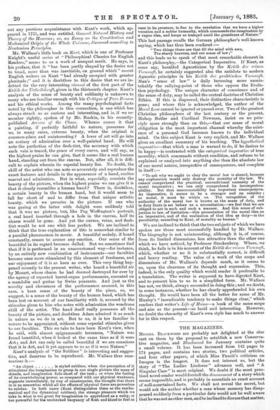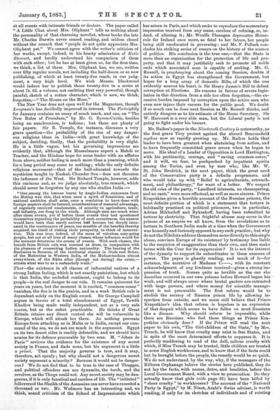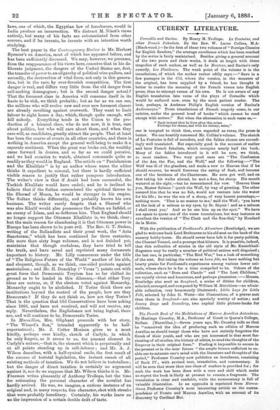THE MAGAZINES.
MESSRS. BLACKWOOD are probably not delighted at the slur cast on them by the proposal to establish a new Conserva- tive magazine, and Blackwood for January contains quite a small volume. It has been increased from 142 pages to 174 pages, and contains two stories, two political articles, and four other papers, of which Miss Faucit's criticism on Imogen is the longest. It does not interest us, but the story of "The Ladies Lindores " advances well, and "A Singular Case" is most original. We doubt if the most prac- tised novel-reader would foretell the denouement of a story which seems impossible, and is probably in essentials an exact account of well-ascertained facts. We shall not reveal the secret, but would ask the author whether a man whose memory has disap- peared suddenly from a particular date would not be well aware that he was not as other men, and be inclined to discuss that matter, at all events with intimate friends or doctors. The paper called "A Little Chat about Mrs. Oliphant" tells us nothing about the personality of that charming novelist, whose books the late Mr. Charles Darwin never ceased reading, and seldom closed without the remark that "people do not quite appreciate Mrs.
Oliphant yet." We cannot agree with the writer's criticism of her works, except, indeed, in his hearty admiration of Katie Stewart, and hardly understand his comparison of them
with each other; but he has at least given us, for the first time, we think, a list of them. Mrs. Oliphant has, we see, written over fifty regular novels, not including the half-dozen or So now publishing, of which at least twenty-five reach, in our judg-
ment., a very high level. ' We wish Messrs. Blackwood would induce her to publish those twenty-five in a series at about 7s. 6d. a volume, not omitting that very powerful, though
painful, sketch of a rotten character, which is now, we think, forgotten,—" The House on the Moor."
The New Year does not open well for the Magazines, though Iongman'e has decidedly improved in interest. The Fortnightly
for January contains no essay of much mark, and one, on " The New Rules of Procedure," by Mr. G. Byron-Curtis, besides being an anachronism, is tedious ; bat there are plenty of fair papers. Sir R. Temple, for instance, discusses a very grave question—the probability of the rise of any danger- ous religious ideas in India—with great knowledge of the subject, deciding, finally, that the probability is very slight. He is a little vague, but his governing impressions are evidently that, although the Mussulmans expect a Mehdi or Teacher, and the Hindoos hope for some leader with an afflatus from above, neither feeling is much more than a yearning, which for a long period may come to nothing ; while the only definite religious movement—that of the half-educated towards the mysticism taught by Keshab Chunder Sen—does not threaten the influence of the West. Sir Richard Temple, however, adds this ominous and, as we judge absolutely, true remark, which should never be forgotten by any one who studies India
"One among the lessons learnt by Anglo-Indian statesmen from the Mutiny was this, that when once a spirit of fanaticism and of national ambition shall arise, once a resolution to have done with foreign masters shall be formed, considerations of material advantage, of regularly received emoluments, of security to agriculture, trade, and industry, are flung to the winds. Although men are much wiser after these events, yet if before those events they had questioned themselves regarding the probability of such occurrences, the answer would have been that surely natives lard become too deeply inter- ested in the continuance of peace, too sensible of the benefits thereby acquired, too timid of risking their prosperity, to think of insurrec- tion. This was true, indeed, of the mass of voiceless, easy-going people, but not at all true of many classes, whose influence would for the moment determine the coarse of events. With each classes, the benefit from British rule was counted as dross, in comparison with the pleasure of reasserting Indian nationality. The bearing of the Brahmins in Benares, of the territorial classes in Oude and Behar, of the Mahrattas in Western India, of the Mnhammadans almost everywhere, of the Sikhs after (though not during) the crisis,— attests what was to us a melancholy truth."
That—the existence in all classes of influential natives of a
strong Indian feeling, which is not exactly patriotism, but which is that India, the secluded continent, ought to belong to its people—is the real danger to our rule. It remains quiescent for years on years, but the moment it is excited, " common-sense " vanishes, the fire is in the prairie, and in a week British rule is dependent solely on the English sword. Sir George Campbell argues in favour of a total abandonment of Egypt, Tewfik Khedive being made really independent, not as a very safe course, but as the safest practicable. He thinks if Great Britain retains any direct control she will be vulnerable to Europe, which will attack her there. As nothing prevents Europe from attacking us in Malta or in India, except our com- mand of the sea, we do not see much in the argument. Egypt on its two desert sides is readily defensible, and we should have
armies for its defence procurable by two seas. M. "Jehan de Paris" reviews the evidence for the existence of any secret society in France, and finds none, but his argument is a little a priori. That the majority governs is true, and it may,
therefore, act openly; but why should not a dangerous secret society represent a minority ? Because it would not be danger- ous ? We do not find that to be true in the case of Thuggee, and political offenders can use dynamite, the torch, and the revolver, as the Thugs could not. Any secret society may be dan- gerous, if it is only fanatical and careless of life. The "initiated" followers of the Sheikh of the Assassins can never have exceeded a
thousand or two. Mr. Wedmore has an interesting and, we think,. sound criticism of the School of Impressionists which has arisen in Paris, and which seeks to reproduce the momentary impression received from any scene, careless of refining, or, in- deed, of altering it; Mr. Woulfe Flanagan deprecates Home- rule for Ireland once more, as fatal to her future, her people being still uneducated in governing ; and Mr. F. Pollock con- cludes his striking series of essays on the history of the science of politics. His conclusion is the true one,—that the State is more than an organisation for the protection of life and pro- perty, and that it may justifiably seek to promote all noble ends which associated man is capable of seeking. Mr. G. Russell, in prophesying about the coming Session, doubts if its action in Egypt has strengthened the Government, but hopes for a long array of domestic Bills, of which the one evidently nearest his heart is Sir Henry James's Bill to defeat corruption at Elections. He reasons in favour of severe legis- lation in this direction from a side too often forgotten,—the ex- cessive burden imposed by corruption upon the active men who even now injure their careers for the public good. We doubt if so much can be done next Session as Mr. Russell thinks, and entirely disagree as to his estimate of the Home Secretary. Six W. Harcourt is a very able man, but the Liberal party is not going to fight under his banner.
Mr. Raikes's paper in the Nineteenth Century is noteworthy, as the first grave Tory protest against the absurd Beaconsfield mythus now so rapidly growing up. Mr. Raikes holds that leader to have been greatest when abstaining from action, and to have frequently committed grave errors when he began to move. His ideal of a Leader of Opposition is Lord Hartington, with his pertinacity, courage, and "saving common-sense," and it will, we fear, be poohpoohed by impatient spirits among the Tories, and even by men who, like Mr. W. St. John Brodrick, in the next paper, think the great need of the Conservative party is a definite programme, and who would take up with "Relief to agriculturists, retrench- ment, and philanthropy," for want of a better. We suspect the old cries of the party, "Landlord interests, no cheeseparing, and no cant," were more effectual, as well as more sinCere. Prince Krapotkine gives a horrible account of the Russian prisons, the most definite portion of which is a statement that torture is habitually practised on political prisoners, two in particular, Adrian Mikhailoff and Ryksakoff, having been submitted to torture by electricity. That frightful abuses may occur in the prisons of an empire we all know, from the revelations as to torture in Southern India made at a time when the Government was honestly and furiously opposed to any such practice; but why do not the Nihilists address themselves more directly to this single abuse, convince Europe of its existence by testimony less liable to the suspicion of exaggeration than their own, and then make terms with the Czar for its suppression ? It is not the interest of the dynasty to support its subordinates in these excesses of power. The paper is ghastly reading, and much of it—for instance, the narrative of Madame C—, with its constant acknowledgment of any kindness received—gives a strong im- pression of truth. Scenes quite as terrible as the one she describes occurred in our own prisons before Howard began his work, and will always occur where brutal gaolers are entrusted with large powers, and where money for scientific manage- ment is not procurable. The first reform would be to abolish the secrecy of Russian prison life by allowing in- spection from outside, and we must still believe that Prince Krapotkine's idea that reform is hopeless is an expression of that despair which seems to have fallen on most Russians like a disease. Why should reform be impossible, while there are Russians who feel these things as Prince Kra-. potkine obviously does ? If the Prince will read the next paper to his own, "The Girl-children of the State," by Mrs. Trench, he will know that cruelty may exist in free States, and in spite of the most determined efforts to suppress it. It is perfectly maddening to read of the dull, callous cruelty with which, if Miss Trench may be trusted, little children are treated in some English workhouses, and to know that if the facts could but be brought before the people, the remedy would be so quick. We do not understand, by the way, why, if the managers of the Kilburn Orphanage believe the stories here published, they do not lay the facts, with names, dates, and localities, before the Local Government Board, with a view to prosecution. Do they actually know that girls (vide page 81) have been killed by "sheer cruelty" in workhouses? The account of the "National Party in Egypt," by M. Ninet, Axabi's Swiss adviser, is worth reading, if only for its sketches of individuals and of existing
laws, one of which, the Egyptian law of foreclosure, would in India produce an insurrection. We distrust M. Ninet's views entirely, but many of his faits are substantiated from other sources, and if he invents, he invents with an intention worth studying.
The best paper in the Contemporary Review is Mr. Herbert Spencer's on America, most of which has appeared before, and has been safficientif discussed. We may, however, we presume, from the reappearance of his views here, conceive that in his de- liberate judgment, the dangers of the United States are, first, the transfer of power to an oligarchy of political wire-pullers, and secondly, the destruction of vital force, not only in this genera- tion, but in the race, by over-feverish competition. The first danger is real, and differs very little from the old danger from self-seeking demagogues ; but is the second danger actual ? That the foremost class in America will consume itself in its haste to be rich, we think probable; but as far as we can see, the millions who will evolve new and ever new foremost classes are already revolting against overwork. They want to limit labour to eight hours a day, which, though quite enough, will kill nobody. Everything tends in the Union to the pro- duction of a leisured class, who do not now, it is true, care about politics, but who will care about them, and when they care will, as candidates, greatly attract the people. That at least has been the coarse of events in all other countries, and thera is nothing in America except the general well-being to make it a separate continent When the great war broke out, the wealthy came forward in dozens, and so far as we could perceive, and we had occasion to watch, obtained commands quite as readily as they would in England. The article on " Panislamism and the Khalifate " is by an author whose name the editor thinks it expedient to conceal, but there is hardly sufficient visible reason to justify that rather pompous introduction. The writer's view is that if Arabi had been successful, the Turkish Khalifate would have ended; and he is inclined to believe that if the Sultan surrendered the spiritual throne to the Sheraef of Mecca, he would be stronger in his empire. The Sultan thinks differently, and probably knows his own business. The writer surely forgets that a Shereef who was also Khalif would also pronounce the Sultan an Infidel, or an enemy of Islam, and so dethrone him. That England should no longer support the Ottoman Khalifate is, we think, clear; but the main reason for abandoning it is that Ottoman power in Europe has been shown to be pure evil. The Bev. G. T. Stokes, writing of the Bollandists and their great work, the "Acta Sanctoram," which has been continued for three centuries, fills more than sixty huge volumes, and is not finished yet, maintains that though credulous, they have tried to tell the truth, and have saved and reprinted many documents important to history. Mr. Lilly commences under the title of "The Religions Future of the World" another of his able, and eloquent, though, as we think, one.sided protests against materialism ; and Mr. H. Dunckley (" Verax ") points out with great force that Democratic Toryism has so far shifted its ground as to be landed in this dilemma,—that either Tory ideas are untrue, or, if the electors voted against Monarchy, Monarchy ought to be abolished. If Tories think there are institutions beyond the control of the people, how are they Democrats ? If they do not think so, how are they Tories ? That is the question that Old Conservatives have been asking since 1866, and have not received, and will not receive, any reply. Nevertheless, the Englishman not being logical, there are, and will continue to be, Democratic Tories.
In Macmillan, Mrs. Oliphant proceeds with her story, " The Wizard's Son," intended apparently to be half- supernatural ; Mr. J. Cotter Morison gives us a most kindly, perhaps over kindly, sketch of Carlyle, in which he only forgets, as it seems to us, the peasant element in Carlyle's nature,—that is, the element which is perpetually and at all points standing up in self-defence ; and Mr. A. J. Wilson describes, with a half-cynical smile, the first result of the success of teetotal legislation, the instant smash of all existing methods of taxation. We do not believe in teetotalism; but the danger of direct taiation is certainly no argument against it, nor do we suppose that Mr. Wilson thinks it is. Mr. Freeman writes pleasantly of Anthony Trollop% but the time for estimating the personal character of the novelist has hardly arrived. He was, we imagine, a curious instance of an original and, in many respects, fine character, shot with streaks that were probably hereditary. Certainly, his works leave on us the impression of a certain double drift of taste.
















































 Previous page
Previous page